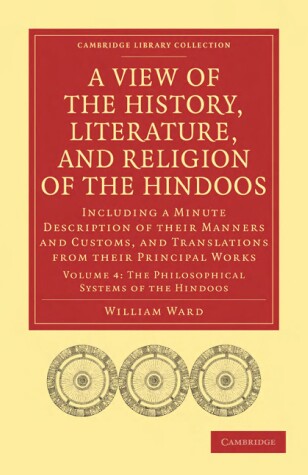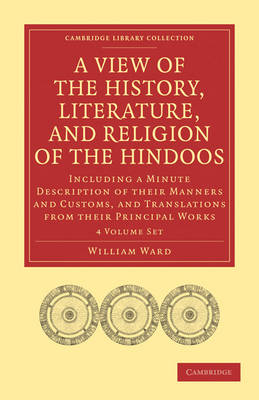Cambridge Library Collection - Religion
4 primary works • 5 total works
Volume 1
A View of the History, Literature, and Religion of the Hindoos: Volume 1, Objects of Worship
by William Ward
Published 25 February 2010
William Ward's account of the Hindu communities among whom he served as a Baptist missionary in Serampore in West Bengal was first published in 1811 and reprinted in this third edition in 1817. It was an extremely influential work that shaped British views of the newly defined entity of 'Hinduism' in the early nineteenth century. Ward and his fellow missionaries promoted social reforms and education, establishing the Serampore Mission Press in 1800 and Serampore College in 1818. Ward devoted twenty years to compiling his study of Hindu literature, history, mythology and religion, which was eventually published in four volumes. It provided richly detailed information, and was regarded as authoritative for the next fifty years. It is therefore still an important source for researchers in areas including Indian history, British colonialism, Orientalism and religious studies. Volume 1 describes and categorises Hindu deities and objects of worship, celestial, terrestrial, animate and inanimate.
Volume 2
A View of the History, Literature, and Religion of the Hindoos: Volume 2, The Hindoo Mythology
by William Ward
Published 25 February 2010
William Ward's account of the Hindu communities among whom he served as a Baptist missionary in Serampore in West Bengal was first published in 1811 and reprinted in this third edition in 1817. It was an extremely influential work that shaped British views of the newly defined entity of 'Hinduism' in the early nineteenth century. Ward and his fellow missionaries promoted social reforms and education, establishing the Serampore Mission Press in 1800 and Serampore College in 1818. Ward devoted twenty years to compiling his study of Hindu literature, history, mythology and religion, which was eventually published in four volumes. It provided richly detailed information, and was regarded as authoritative for the next fifty years. It is therefore still an important source for researchers in areas including Indian history, British colonialism, Orientalism and religious studies. Volume 2 focuses on places of worship, ritual practices, and beliefs about death and reincarnation.
Volume 3
William Ward's account of the Hindu communities among whom he served as a Baptist missionary in Serampore in West Bengal was first published in 1811 and reprinted in this third edition in 1817. It was an extremely influential work that shaped British views of the newly defined entity of 'Hinduism' in the early nineteenth century. Ward and his fellow missionaries promoted social reforms and education, establishing the Serampore Mission Press in 1800 and Serampore College in 1818. Ward devoted twenty years to compiling his study of Hindu literature, history, mythology and religion, which was eventually published in four volumes. It provided richly detailed information, and was regarded as authoritative for the next fifty years. It is therefore still an important source for researchers in areas including Indian history, British colonialism, Orientalism and religious studies. Volume 3 focuses on the social history of India, the caste system, and birth rituals.
Volume 4
William Ward's account of the Hindu communities among whom he served as a Baptist missionary in Serampore in West Bengal was first published in 1811 and reprinted in this third edition in 1817. It was an extremely influential work that shaped British views of the newly defined entity of 'Hinduism' in the early nineteenth century. Ward and his fellow missionaries promoted social reforms and education, establishing the Serampore Mission Press in 1800 and Serampore College in 1818. Ward devoted twenty years to compiling his study of Hindu literature, history, mythology and religion, which was eventually published in four volumes. It provided richly detailed information, and was regarded as authoritative for the next fifty years. It is still an important source for researchers in areas including Indian history, British colonialism, Orientalism and religious studies. Volume 4 includes translations from Hindu sacred texts and philosophical writings, and Ward's own reflections on education.
A View of the History, Literature, and Religion of the Hindoos 4 Volume Paperback Set
by William Ward
Published 2 November 2010
William Ward's account of the Hindu communities among whom he served as a Baptist missionary in Serampore in West Bengal was first published in 1811 and reprinted in this third edition in 1817. It was an extremely influential work that shaped British views of the newly defined entity of 'Hinduism' in the early nineteenth century. Ward and his fellow missionaries promoted social reforms and education, establishing the Serampore Mission Press in 1800 and Serampore College in 1818. Ward devoted twenty years to compiling his study of Hindu literature, history, mythology and religion, which was eventually published in four volumes. It provided richly detailed information, and was regarded as authoritative for the next fifty years. It is still an important source for researchers in areas including Indian history, British colonialism, Orientalism and religious studies.


